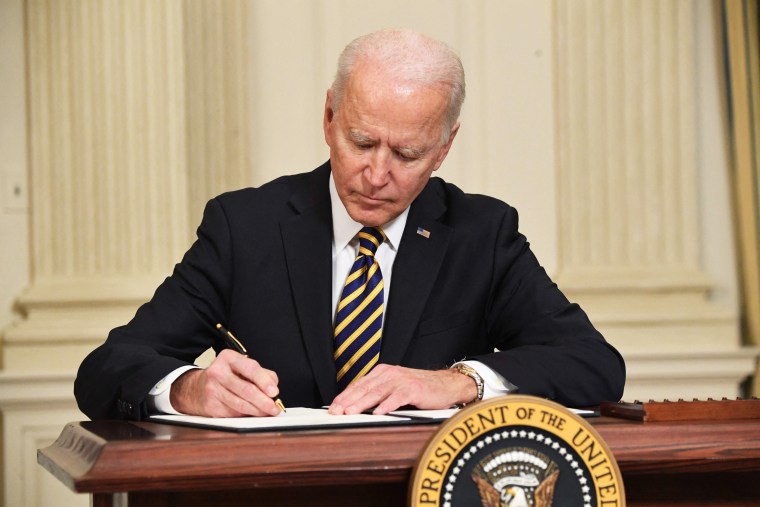WASHINGTON — President Joe Biden signed an executive order Wednesday requiring a review of the global supply chains in key industries in an effort to boost domestic production and avoid shortages in critical goods amid the coronavirus pandemic.
Biden's action was spurred in part by the global semiconductor shortage, which began shortly after the coronavirus pandemic hit last year. Semiconductors, commonly known as chips and used in a range of products including cellphones and computers, and were in high demand as consumers around the world purchased equipment to work from home. The shortage has severely impacted automakers and other manufacturers and led to slowdowns in production.
"This is about making sure that the United States can meet every challenge we face in this new era," Biden said, ahead of signing the order at the White House. "The best way to do that is by protecting and sharpening America's competitive edge by investing here at home."
Biden said the order was also prompted by the widespread shortage of personal protective equipment at the beginning of the pandemic, forcing some front-line healthcare workers to resort to makeshift masks and surgical gowns.
The executive order calls for a 100-day review to assess vulnerabilities and areas for improvement of supply chains for four areas: pharmaceuticals, rare earth minerals, semiconductor chips and large-capacity batteries.
The order also calls for a separate, year-long review of six broader supply chains: defense, public health, communications technology, energy, transportation and food production.
Biden said that the solution to supply chain issues will be to increase domestic production in certain industries as well as work with allies to prevent future shortages.
He acknowledged that Wednesday's order will not immediately fix the semiconductor shortage, but stressed the importance of addressing supply issues to avoid future crises.
"We all recognize that the particular problem will not be solved immediately. In the meantime, we are reaching out to our allies, semiconductor companies and others in the supply chain, to ramp up production to help us resolve the bottlenecks now," Biden said.
"We need to stop playing catchup."
The order is designed to supplement Biden's earlier executive order to promote products made in America to bolster American supply chains and make sure that critical materials are made in the U.S., Biden said.
Earlier Wednesday, Biden met with a group of bipartisan lawmakers in the Oval Office to discuss semiconductors and other supply chain problems. Biden, who has hosted a number of these bipartisan meetings since taking office, said Wednesday's gathering was the "best" he has had so far.
"It was like the old days, people are actually on the same page," he said.
There have been reports of manufacturing shortages in the auto and tech industries because of the pandemic, and a recent study by the American Society of Health-System Pharmacists suggested that trade restrictions and the pandemic could significantly disrupt the delivery of health care supplies.
Download the NBC News app for breaking news and politics
A senior administration official said the White House sees the potential for bipartisan support from Congress to pass legislation to codify the basic elements of the order.
The White House has said that the order is not aimed at competing with China, although the review will seek to determine whether U.S. industries rely too much on foreign suppliers.
The Biden administration this month reviewed the core elements of U.S. policy toward China during the Trump administration and found "deep problems" with its policies toward China.
Biden spoke with Chinese President Xi Jinping by phone this month for the first time since he took office and raised "fundamental concerns" about Beijing's "coercive and unfair economic practices," among other issues.


